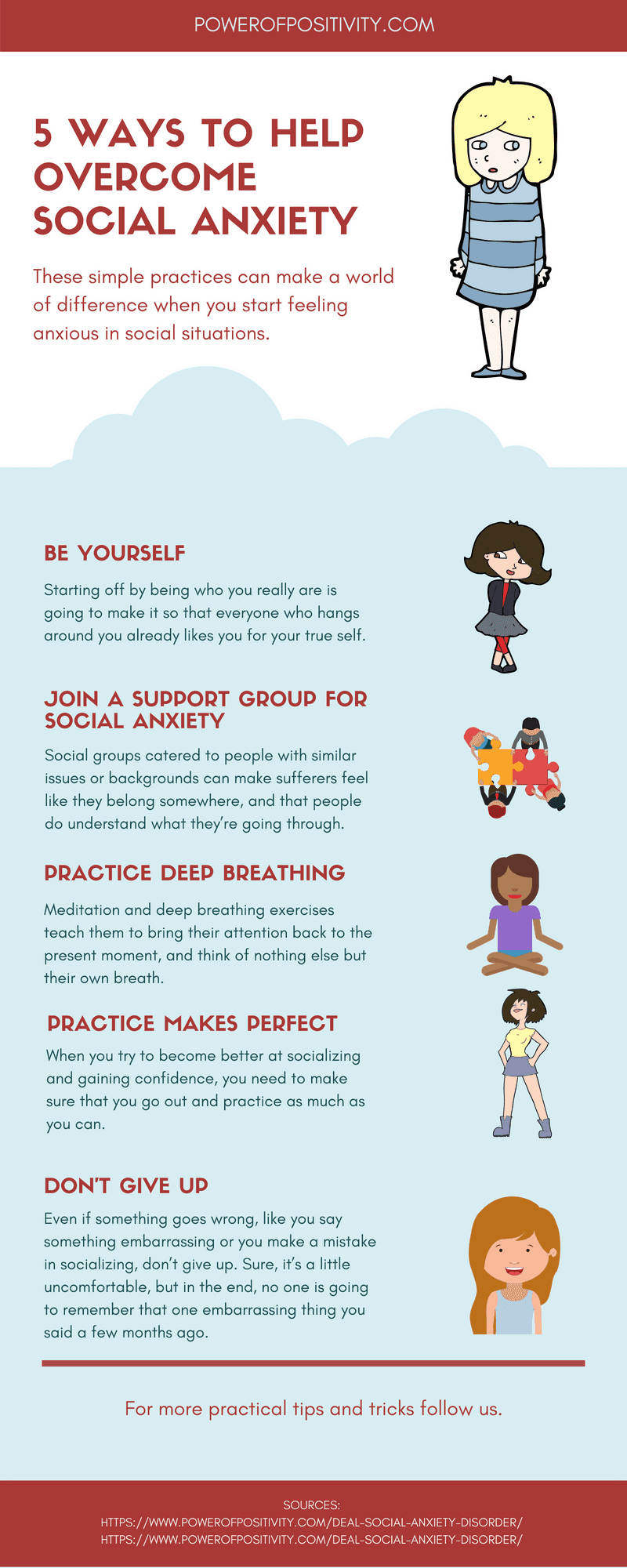According to the Anxiety and Depression Association of America, social anxiety disorder affects 6.8% of the U.S. population or 15 million people. Social anxiety can afflict both introverts and extroverts, and isn’t necessarily synonymous with being shy. Those who suffer from it can become triggered in various social situations, from grocery stores to large parties to shopping malls. Despite efforts to calm the anxiety, it can easily debilitate the sufferer and become a fixation. People with social anxiety have an extreme fear of interacting with others in certain settings, and everyday life can become a constant uphill battle
Many people who suffer from social anxiety feel trapped inside their own minds and thoughts, and they tend to isolate themselves for periods if the anxiety becomes too much to bear. Many people unfortunately don’t understand what those who have social anxiety go through on a daily basis, so we made this small list correcting common misconceptions and clearing the air about what it means to have social anxiety.
Here are 5 things those with social anxiety need you to know:
1. Just because we have social anxiety, it doesn’t mean we hate people.
In fact, this is pretty much the opposite of how most of us feel. You don’t know how badly those with social anxiety wish they could talk to people normally, without feeling constricting in their chest, their heart beating in their throats, sweat beading on their foreheads, and every other physical symptom that goes along with social anxiety. Most of us actually love people, and long to approach them and have conversations without feeling scared or overwhelmed. We might seem a little standoffish or abrupt when you speak to us, but we don’t mean to be rude. We just feel anxious, but that doesn’t mean we don’t enjoy talking to you.
2. We need a lot of time to prepare for social gatherings mentally.
A big gathering can take us days to prepare for. Those with social anxiety know the feeling – going over what you’ll say to people, wondering who all you’ll meet and if the conversations will go smoothly, talking things over in your mind and trying to forget about how nervous you feel for the event, etc. Others might throw on some clothes, show up, and converse with everyone in the room, but we like to know days in advance about plans so that we have time to calm ourselves beforehand.
It takes a lot of energy for those who struggle to actually go to a special event, because we must battle our fears each time. Even showing up at all is a huge accomplishment in the minds of those with social anxiety.
3. We don’t want to have social anxiety.
We didn’t choose to have it. And we wish we didn’t have it. We try very hard to overcome it. But it might not ever dissipate completely despite our best efforts. People have anxieties of all kinds, but ours just gets triggered by social interactions. Even if we seem fine talking to others, that doesn’t mean we don’t have social anxiety. In fact, most people probably can’t tell the difference between those with social anxiety and those without it. We know that it starts in our minds. But controlling the mind doesn’t happen overnight.
We don’t respond well to people telling us to “stop being dramatic” and “get out of our heads.” We realize that the fear is irrational; however, this doesn’t stop social anxiety just because you don’t understand it or don’t believe in it.
4. We can’t just get over it and move on with our lives.
We hear far too often that we should get over ourselves and life our lives. Believe us, if we could, we would. If only it were that easy, no one would suffer from social anxiety. However, because millions of people around the world have it, it obviously means that people have probably tried that approach already. Like we said before, we can learn to manage our social anxiety through coping techniques, but that doesn’t mean it will ever go away entirely.

5. Just because we seem fine on the outside, doesn’t mean we aren’t freaking out on the inside.
You might say that you can’t tell we have it, but this doesn’t mean it isn’t there. Those with this condition tend to live inside their minds a lot, and often have a high intelligence level due to the constant stream of thoughts we have. Research on this topic is ongoing; some scientists believe it’s due to a chemical imbalance, others believe it’s genetic, and others think it happens because of one’s upbringing. Whatever the reason, calmness on the outside doesn’t reflect our inner selves. We just have learned how to hide our anxious thoughts for the most part, because daily life requires us to.
If you know someone with social anxiety, the best thing you can offer is love and support. You don’t need to fully understand social anxiety to show compassion and understanding to those who need it.



















